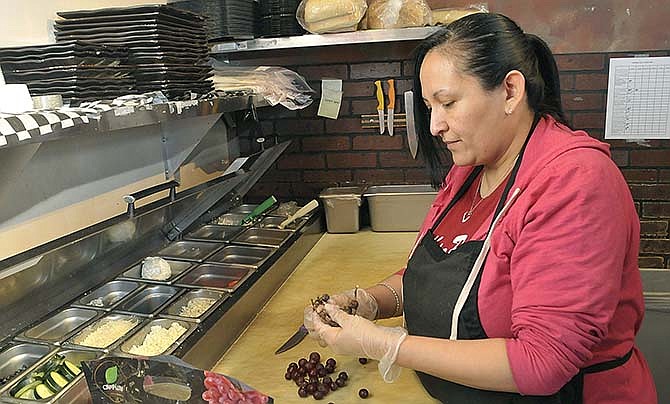Your next trip to Cafe Via Roma might mean more than a cup of coffee.
Central Missouri Community Action (CMCA) officially purchased the East High Street business in November, intending to operate it as a "social enterprise" offering qualifying employees a living wage while they gain work skills to qualify them for higher-paying jobs.
"We feel like we're part of the local economy, and we want to make sure there's local business to be supporting the growth of Jefferson City and the success of all of us," said Darin Preis, CMCA executive director.
CMCA works to "empower individuals and families to achieve self-reliance" in eight counties including Cole. Its other programs include the Head Start early childhood education program for low-income families and the Missouri Work Assistance Program (MWAP), which provides people opportunities to participate in "work-ready activities" such as classes, volunteering or agency-subsidized positions that hopefully lead to permanent work.
"It's a great program. It's designed for kind of the hardest to employ, and a lot of times soft skills are kind of the issue - what's the appropriate dress for work, being on time," Preis said. "Customer service is something we're really going to focus a lot on - skills that aren't necessarily part of the day-to-day expectation for that population. But that's what it takes to be successful in a middle-class society."
Cafe Via Roma will follow the MWAP model. New employees recruited through CMCA's Family Resource Center will begin as volunteers, with CMCA later subsidizing their positions and eventually hiring them full-time on the restaurant's budget - receiving on-the-job training along the way. Ideally, employees would stay with Cafe Via Roma for about a year, Preis said. Then they would move on to better prospects.
"They'll gain job skills and be able to move into a higher-paying position - assistant manager or manager-type positions in other restaurants, and probably anything that has a customer-service component to it, I would think," Preis said.
He noted some positions, like manager, would require more long-term stability. Cafe Via Roma currently employs four people and is looking to hire a manager and an additional kitchen staff member. It could employ up to seven, plus two MWAP volunteers, during the busiest season when the Legislature is in session at the Capitol.
Since CMCA purchased the restaurant three months ago, the agency has maintained existing employees while hiring two volunteers - neither of whom stayed on. Like many new business owners, CMCA has not yet made a profit.
"We're experiencing transition pains," Preis said. "I don't think it's uncommon instability, but it's instability. It makes us nervous, but we're learning how to deal with it."
The frequent turnover, whether planned or unplanned, will mean a heightened focus on maintaining quality.
Former owner Audrey Kauffman, who remains on call as a consultant, said she left systems in place to ensure the customer experience remains the same.
"I have checklist procedures for every area - food side, drink side, opening, closing. If someone follows the checklists, I mean, they're golden," she said. "That helps with consistency. ... Unless there are any dramatic changes, that will be what will help CMCA."
"It's going to be constant training and just that constant focus on customer service and cleanliness," Preis added. "Audrey has done a pretty amazing job of setting an expectation for the cafe. We want to maintain that expectation, so customers should expect to get the same level of service and the same quality that they always have."
Already, CMCA has made significant initial investments to start out on the right foot: installing new lighting, updating the Cafe Via Roma website, repairing a freezer. Soon the agency will purchase a new point-of-sale system to track inventory more closely. If CMCA receives enough Neighborhood Assistance Program donations, it will make additional purchases including new wall menus, employee uniforms and a catering van.
"I would love to expand some more dining space," Preis said. "I don't think that's an option for us right now. But Central Bank owns this building and they're renovating the upper floors potentially for meeting space and conference space and things like that, and I'd love to have a catering arrangement with them."
He'd also like to increase the social enterprise's hallmark living wage. Currently, all Cafe Via Roma employees make at least $8.50 an hour. When profits cooperate, Preis would like that to edge up.
"When we get to the point of being profitable, any profit we generate goes back into Central Missouri Community Action, back into the programs and services that we operate here in Cole County," Preis said. "Most of our programs are federal funding. ... There's been a lot of instability in our federal government over the last couple of years from a funding perspective, so we and the board of directors at CMCA decided that we're going to start diversifying our revenue and look for different ways to support our programs and services - because they're too important to the community to just stop doing."

